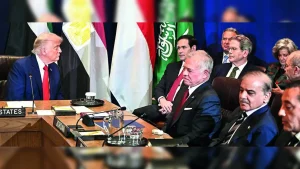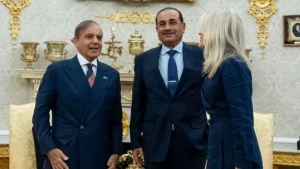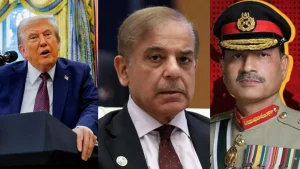Washington D.C. – President Donald Trump hosted Pakistan Prime Minister Shehbaz Sharif at the White House on Thursday, marking a significant milestone in US Pakistan relations and signaling warming ties between Washington and the South Asian nuclear power. The closed-door meeting, which lasted over an hour, represents the latest development in increasingly positive bilateral engagement between the two nations.
The evolving US Pakistan relations stand in stark contrast to Trump’s strained relationship with Indian Prime Minister Narendra Modi, who was once considered among the Republican president’s closest world leader allies during his first term. This diplomatic shift reflects changing geopolitical dynamics in South Asia and beyond.
Regional Strategy and Gaza Discussions

Sharif’s participation in broader Middle Eastern diplomacy underscores the improving US Pakistan relations. The Pakistani Prime Minister was among top officials from eight Arab or Muslim countries who met with Trump on the sidelines of the UN General Assembly this week to discuss strategy for ending the Israel-Hamas war in Gaza.
This inclusion in high-level regional discussions demonstrates Pakistan’s restored standing in American foreign policy calculations, marking a departure from previous periods of diplomatic tension. The expanded US Pakistan relations now encompass both bilateral concerns and broader regional security matters.
Trade Agreement and Economic Cooperation

A significant factor driving improved US Pakistan relations is the comprehensive trade agreement reached in July. This deal is expected to allow Washington to help develop Pakistan’s largely untapped oil reserves while simultaneously lowering tariffs for Islamabad, creating mutual economic benefits for both nations.
The oil development component of the agreement represents particularly strategic importance for US Pakistan relations, potentially reducing Pakistan’s energy dependence on other powers while providing American companies access to promising petroleum resources. These economic ties form the foundation of the renewed partnership.
India Factor and Geopolitical Realignment
The improvement in US Pakistan relations coincides with deteriorating ties between Washington and New Delhi, primarily over India’s increased purchases of discounted Russian oil following Moscow’s February 2022 invasion of Ukraine. Trump has dramatically raised tariffs on India for these oil purchases, attempting to apply indirect economic pressure on Russia.
India and Pakistan, as neighboring nations and fierce rivals, create a complex diplomatic equation. The shifting US Pakistan relations reflect Trump’s strategic recalibration based on each country’s current policies and alignment with American interests, particularly regarding Russia and Ukraine.
Nobel Prize Endorsement and Diplomatic Favor


Sharif has gained considerable favor with Trump since publicly endorsing the American leader for a Nobel Peace Prize for his administration’s efforts this year at reducing tensions between Pakistan and India. This public endorsement has contributed positively to US Pakistan relations and demonstrates Sharif’s diplomatic acumen.
India and Pakistan agreed to a ceasefire in May following US-led talks that ended the most serious military confrontation between the nuclear-armed rivals in decades. The deal followed weeks of clashes, missile and drone strikes across their borders, triggered by a massacre of tourists that India blames on Pakistan—a charge Islamabad denies.
Contrasting Leadership Responses
Unlike Sharif’s enthusiastic embrace of Trump’s diplomatic efforts, Prime Minister Modi has declined to indulge Trump’s attempt to claim credit for brokering the India-Pakistan ceasefire. This contrasting response has influenced the trajectory of US Pakistan relations while complicating US-India ties.
Also Read: Jaishankar On Terrorism: Powerful Call For Global Unity And Reform At UN G20 Meet
The different approaches by the two South Asian leaders to acknowledging Trump’s role highlight how diplomatic gestures can significantly impact bilateral relationships with the unpredictable American president.
Iran Strike Disagreement
Despite generally improving US Pakistan relations, Pakistan did split with Trump on his decision to carry out US strikes in June on three Iranian nuclear facilities. Pakistan stated the attack “constituted a serious violation of international law” and criticized the impact on the International Atomic Energy Agency’s stature.
This disagreement demonstrates that enhanced US Pakistan relations do not mean complete alignment on all international issues, particularly regarding military actions affecting regional stability.
India’s Pivot Toward China and Russia
Recent developments have further complicated regional dynamics affecting US Pakistan relations. Prime Minister Modi was photographed with Russian President Vladimir Putin and Chinese President Xi Jinping during a security summit in Tianjin, northern China, prompting a social media jab from Trump.
“Looks like we’ve lost India and Russia to deepest, darkest, China,” Trump wrote, suggesting concern about India’s strategic orientation. This perceived shift has indirectly benefited US Pakistan relations by creating diplomatic space for Pakistan’s engagement with Washington.
Ongoing India-US Trade Negotiations
Despite tensions, Trump recently offered hope for resolving trade issues with India, stating he looks forward to speaking with Modi in upcoming weeks. Trump hit India with tariffs up to 50% last month, adding to the 25% tariff related to Russian oil purchases.
However, the improved US Pakistan relations provide Washington with alternative regional partnership options, potentially influencing negotiations with New Delhi.
Future Trajectory and Strategic Implications
The White House meeting between Trump and Sharif, where Pakistan’s delegation departed at 6:18 p.m. after substantive discussions, indicates that US Pakistan relations will continue developing positively. The combination of economic agreements, diplomatic alignment on regional issues, and personal rapport between leaders suggests sustained bilateral engagement.
As US Pakistan relations strengthen, the regional balance of power in South Asia continues evolving, with implications for India, Afghanistan, China, and broader Indo-Pacific strategy.

